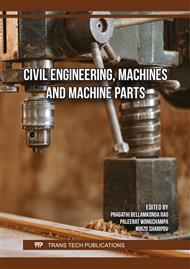p.27
p.33
p.39
p.49
p.61
p.69
p.81
p.95
p.103
Experimental Investigation on Expansive Soil by Using Tile Powder
Abstract:
Our research aims to address the challenges posed by expansive soils, which can swell upon absorbing water and shrink upon drying, posing a threat to structures. Stabilization of such soils is crucial for any construction project, often requiring physical or chemical methods. In this study, tile powder, sourced from a tile manufacturing industry, is utilized as a chemical admixture due to its high lime content, which aids in reducing the swelling nature of expansive soil. Soil samples from three distinct locations were collected and subjected to testing to determine their index properties. Among the samples, the soil exhibiting significant swelling characteristics was selected for further analysis. This soil was treated with varying percentages of tile powder (4%, 8%, 12%, 16%, and 20%), and the associated index properties were evaluated. The results indicated a decrease in soil swelling, Atterberg limits, and specific gravity, while the strengths obtained from compaction and unconfined compressive strength tests showed improvement with higher concentrations of tile powder. Notably, 20% percentage of tile powder revealed the most substantial enhancement in soil strength. This study underscores the potential of tile powder as an effective stabilizer for expansive soils, offering a sustainable solution for efficiently utilizing waste materials in construction projects.
Info:
Periodical:
Pages:
69-79
DOI:
Citation:
Online since:
December 2024
Authors:
Keywords:
Price:
Сopyright:
© 2024 Trans Tech Publications Ltd. All Rights Reserved
Share:
Citation:



